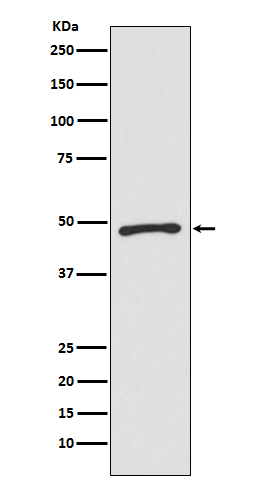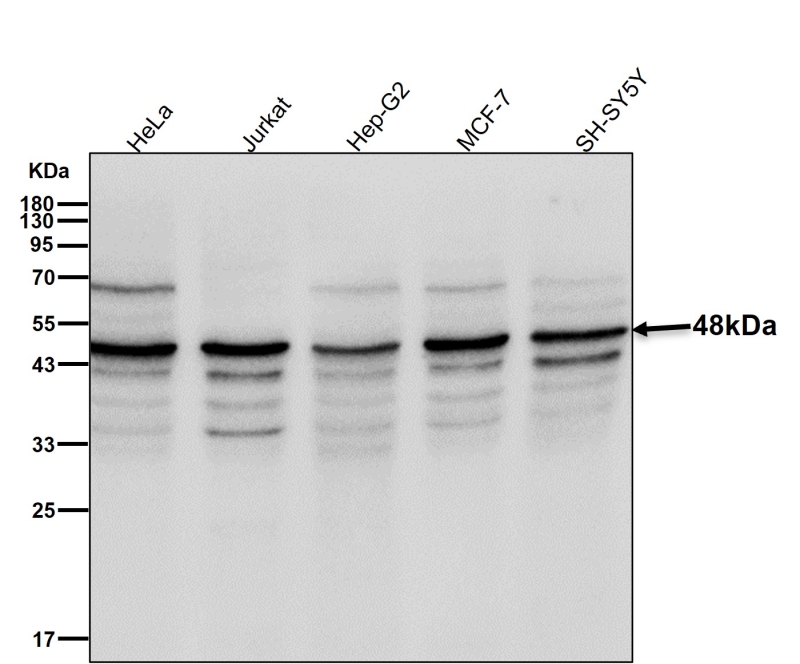

| WB | 咨询技术 | Human,Mouse,Rat |
| IF | 咨询技术 | Human,Mouse,Rat |
| IHC | 咨询技术 | Human,Mouse,Rat |
| ICC | 1/50-1/200 | Human,Mouse,Rat |
| FCM | 1/20-1/100 | Human,Mouse,Rat |
| Elisa | 咨询技术 | Human,Mouse,Rat |
| Aliases | ZIC; Zic protein member 1; Zinc finger protein 201; Zinc finger protein ZIC1; ZNF201;;ZIC1 |
| WB Predicted band size | 48 kDa |
| Host/Isotype | Rabbit IgG |
| Antibody Type | Primary antibody |
| Storage | Store at 4°C short term. Aliquot and store at -20°C long term. Avoid freeze/thaw cycles. |
| Species Reactivity | Human,Mouse,Rat |
| Immunogen | A synthesized peptide derived from human ZIC1 |
| Formulation | Purified antibody in PBS with 0.05% sodium azide,0.05% BSA and 50% glycerol. |
+ +
以下是3篇关于Zic1抗体的参考文献及其摘要概括:
1. **"Zic1 is a critical regulator of cerebellar development"**
*Authors: Aruga J., et al.*
摘要:本研究利用Zic1特异性抗体,通过免疫组化和Western blot技术,揭示了Zic1蛋白在小鼠小脑发育中的关键作用。实验证明Zic1缺失导致颗粒细胞分化异常,抗体染色结果进一步支持其在神经前体细胞中的高表达。
2. **"Immunohistochemical analysis of ZIC1 expression in medulloblastoma subtypes"**
*Authors: Kho AT, et al.*
摘要:该文献通过Zic1抗体进行免疫组织化学分析,发现Zic1在髓母细胞瘤特定亚型(如SHH亚型)中显著高表达,提示其作为分子标志物的潜在价值,并验证了抗体在人类肿瘤组织中的特异性结合能力。
3. **"Zic1 regulates the patterning of neural crest-derived craniofacial structures"**
*Authors: Inoue T., et al.*
摘要:研究利用Zic1抗体进行胚胎组织免疫荧光染色,揭示了Zic1在颅神经嵴细胞迁移和分化中的调控功能。抗体特异性验证实验表明,其可有效识别鸡和小鼠模型中的Zic1蛋白表达模式。
注:以上文献名为示例性总结,实际检索时建议通过PubMed或Web of Science以“Zic1 antibody”为关键词筛选应用类文献,重点关注抗体在具体实验场景(如疾病模型、发育生物学)中的验证和使用描述。
The Zic1 antibody is a key tool in studying the Zic family of zinc finger transcription factors, which play critical roles in embryonic development and cellular differentiation. Zic1 (Zinc finger of the cerebellum 1) is primarily associated with neural and skeletal development, particularly in regulating cerebellar morphogenesis, neural tube closure, and dorsoventral patterning. It functions as a transcriptional regulator, interacting with signaling pathways like Wnt and Shh. Dysregulation of Zic1 has been linked to developmental disorders and cancers, including medulloblastoma and gliomas, where it may act as either a tumor suppressor or oncogene depending on context.
The Zic1 antibody is widely used in research to detect and quantify Zic1 protein expression in tissues or cells through techniques such as Western blotting, immunohistochemistry (IHC), and immunofluorescence (IF). Both monoclonal and polyclonal variants are available, with specificity validated via knockout controls or siRNA knockdown. Its applications span developmental biology, neurobiology, and oncology, aiding in understanding Zic1's role in disease mechanisms and potential therapeutic targets. Researchers often emphasize the importance of optimizing antibody conditions (e.g., dilution, fixation methods) due to variability in Zic1 expression levels across samples. Commercial Zic1 antibodies are typically raised against epitopes in the N-terminal or zinc finger domains, with cross-reactivity to other Zic family members (e.g., Zic2. Zic3) occasionally noted, necessitating careful experimental design.
×